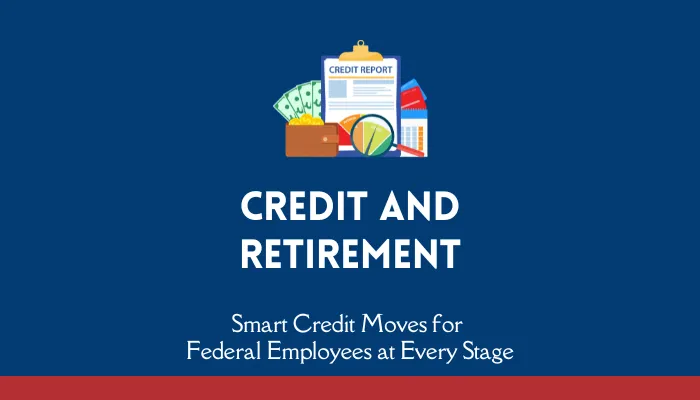INSIDE YOUR FERS BENEFITS

Credit and Retirement: Smart Credit Moves for Federal Employees at Every Stage
Credit and Retirement: Smart Credit Moves for Federal Employees at Every Stage
As a federal employee, your career comes with financial stability, a reliable salary, and long-term benefits like FERS retirement and Thrift Savings Plan (TSP) contributions. But have you considered how credit and retirement go hand in hand?
Your credit score doesn’t just impact your ability to buy a home or finance a car—it plays a crucial role in your long-term financial security, retirement lifestyle, and ability to manage expenses in your later years. Understanding how credit health affects your retirement plans can help you make smart credit moves at every stage of your federal career.
Why Credit Matters for Your FERS Retirement
1. Homeownership & Mortgage Approvals
Many federal employees look to buy a home early in their careers or refinance before retirement. A strong credit score is essential to:
✔ Secure low mortgage interest rates, saving thousands over time.
✔ Qualify for better loan terms with VA, FHA, or conventional mortgages.
✔ Avoid high-cost borrowing during retirement, keeping your monthly expenses lower.
2. Financial Security in Retirement
Even if you have FERS, TSP savings, and Social Security benefits, you may still need access to credit for:
✅ Downsizing or buying a retirement home.
✅ Home renovations or unexpected expenses.
✅ Medical bills or long-term care.
A strong credit profile ensures better financial flexibility when you need it most.
3. Lower Interest Rates & Debt Management
Carrying debt into retirement can drain your savings faster. A high credit score allows you to:
✔ Refinance high-interest loans before retiring.
✔ Access better credit card perks with lower rates and rewards.
✔ Reduce financial stress by keeping debt at manageable levels.
Smart Credit Moves for Federal Employees: From Career to Retirement
📌 Early Career (Starting Strong)
Monitor Your Credit Score Regularly – Use free tools like Experian or Credit Karma.
Use Credit Responsibly – Keep credit utilization under 30%.
Build a Strong Credit History – Make on-time payments and avoid unnecessary debt.
📌 Mid-Career (Maximizing Credit & Financial Stability)
Review Your Credit Report Annually – Check for errors that could impact future loan approvals.
Pay Off High-Interest Debt – Prioritize credit card balances and personal loans.
Optimize Your Mortgage – Refinance for lower rates if needed before rates increase.
📌 Pre-Retirement (5-10 Years Out)
Minimize Debt Before Retiring – Pay off car loans, credit cards, and personal loans.
Keep Credit Accounts Open – Closing accounts can lower your score; instead, keep old accounts active with small purchases.
Plan for Large Expenses Now – If you need a home equity loan or refinance, do it while you still have stable income.
📌 In Retirement (Protecting Your Credit & Savings)
Use Credit Wisely – Avoid unnecessary debt, but keep your score strong for emergencies.
Monitor Your Credit Reports – Watch for fraud or identity theft, which can be harder to recover from in retirement.
Avoid Co-Signing Loans – This can put your credit at risk if the borrower defaults.
Credit and Retirement Go Hand in Hand
A strong credit score is just as important as FERS, TSP contributions, and pension planning when it comes to financial security in retirement. By making smart credit moves throughout your career, you can maximize your savings, reduce financial stress, and ensure a secure retirement.
Take charge of your credit and retirement today—review your credit report, improve your financial habits, and make sure your retirement years are as secure as your career.

